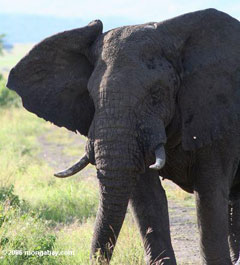Asian gangs fueling the illegal ivory trade
Asian gangs fueling the illegal ivory trade
mongabay.com
May 13, 2007
Asian-run organized crime syndicates based in Africa are behind the rising illegal trade in elephant ivory, reports TRAFFIC, the wildlife trade monitoring network of WWF and IUCN-The World Conservation Union.
The study found that the Democratic Republic of the Congo, Cameroon and Nigeria are the primary sources for poached ivory.
“Markets in China create a high demand for illicit ivory, which arrives either directly or through ports such as Hong Kong, Macao and Taiwan. Japan and Thailand are also important final destinations, whereas the Philippines mainly acts as a transit country linked to the major importers,” said WWF in a statement. “Together, these seven countries and territories account for 62 per cent of the ivory recovered in the 49 largest seizure cases recorded… in the Elephant Trade Information System (ETIS) — the world’s largest database of elephant product seizure records.”

|
The TRAFFIC study shows that ivory seizures average 92 cases a month, or three per day, and that large-scale ivory seizures (of 1 metric ton or more) have increased both in number and in size in recent years.
“This demonstrates greater sophistication, organization and finance behind the illegal movement of ever larger volumes of ivory from Africa to Asia,” said Dr. Susan Lieberman, Director WWF’s Global Species Programme. “This is clearly a negative consequence of the ongoing globalization of African markets and economies.”
The report comes a month after a study in the journal Public Library of Science revealed links between elephant poaching and presence of logging roads in Central Africa.
Related articles
Congo forest elephants declining from logging roads, illegal ivory. Fast-expanding logging roads in the Congo basin are becoming “highways of death” for the fierce but elusive forest elephant, according to a new study published in the journal Public Library of Science. Logging roads both provide access to remote forest areas for ivory poachers and serve as conduits of advancing human settlement.
China drives elephant poaching for ivory trade. Thousands of African elephants are being killed for their ivory tusks, according to a new study led by a biologist from the University of Washington. In a paper published in the online edition of the Proceedings of the National Academy of Sciences, Dr. Samuel Wasser, director of the University of Washington Center for Conservation Biology, shows that elephants are being slaughtered at the highest rate since the international ban on the ivory trade took effect in 1989.
This article is based on a news release from WWF.







